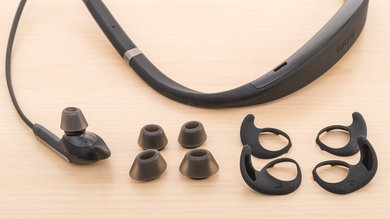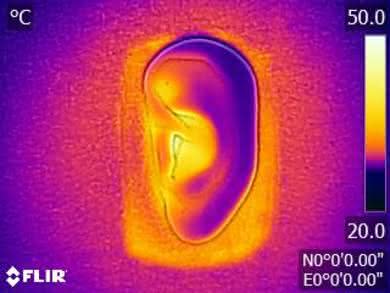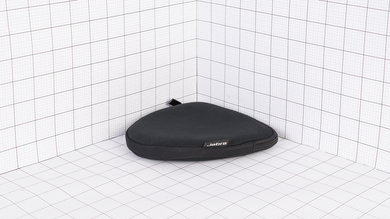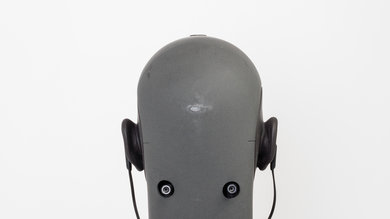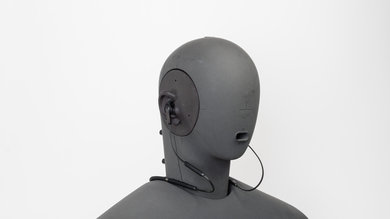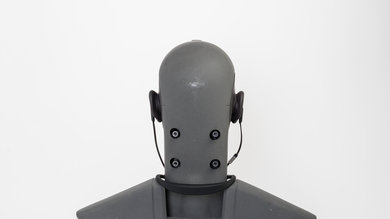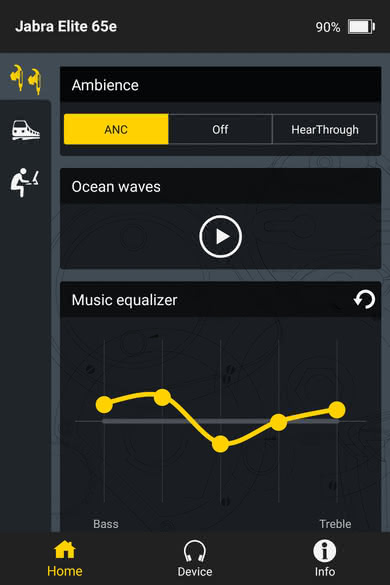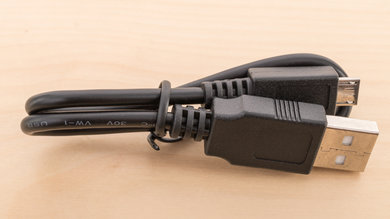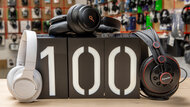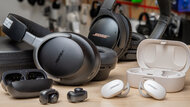The Jabra Elite 65e are comfortable, mixed usage earbuds decent enough for most use cases. They have a good build quality and a flexible design that makes them a bit easier to carry around. They're also stable enough to run with, do not leak much, and block a fair bit of noise with their noise canceling. This makes them a suitable option for the gym, the office, and for commuting. Unfortunately, their sound quality is mediocre.
Our Verdict
Decent for mixed usage. The Jabra Elite 65e have a good design that's durable and portable. They also provide a good amount of isolation for noisy environments and a great control scheme with a lot of functions. They're stable enough to run with and a suitable option for commuting and for the office. Unfortunately, being Bluetooth-only headphones, they won't be the ideal option for gaming or home theater. They also have a mediocre to average sound quality that won't be for everyone but at least you can EQ it via their customizable Sound+ app.
-
Above-average noise cancellation.
-
Rugged and flexible design.
-
Comfortable earbud fit.
-
Mediocre sound quality.
-
Laggy when watching videos.
-
The neckband design won't be for everyone.
Passable for neutral listening. Our measurements show a mismatch that is not as audible. So if you can get them to match with correct positioning, these headphones sound decent and provide a good amount of bass, a moderately well-balanced midrange, and okay treble range. They sound a bit recessed on instruments and vocals, but the pronounced high frequencies and bass range give them an exciting audio reproduction on most tracks. Unfortunately, they can sound a bit sibilant with already bright songs, and they do not have the best soundstage so they won't be the ideal option for more neutral listeners. On the upside, you can EQ their sound quality with Jabra Sound+ app.
Above-average for commuting. They are comfortable, portable and isolate well enough in loud environments to be suitable for the noise or public transit. They also have a decent control scheme and battery life.
Good for sports use. The Jabra Elite 65e are comfortable and stable enough to run with. Thanks to their around-the-neck design, they will rarely fall to the ground even when exercising intensely. However, the neckband can sometimes get caught on items of clothing which may pull the earbuds out of your ears, but it doesn't happen that often and depends on what you're wearing.
Above-average for office use. They barely leak even at high volumes and isolate well enough to block the chatter of a lively workplace. They're comfortable, they have a good control scheme and a decent battery life that lasts long enough for a typical workday.
Below-average for gaming. They have a decent mic and comfortable design but a bit too much latency to be suitable for gaming. They're also Bluetooth-only headphones that will not work with your consoles.
- 7.2 Mixed Usage
- 6.8 Neutral Sound
- 7.8 Commute/Travel
- 7.7 Sports/Fitness
- 7.2 Office
- 5.9 Wireless Gaming
- 5.7 Wired Gaming
- 7.3 Phone Call
Changelog
- Updated Nov 21, 2019: Converted to Test Bench 1.3.1.
- Updated Nov 21, 2019: Converted to Test Bench 1.3.
- Updated Jun 29, 2018: Review published.
- Updated Jun 27, 2018: Our testers have started testing this product.
- Updated Jun 27, 2018: Early access published.
Check Price
Compared To Other Headphones

The Jabra Elite 65e are decent mixed-usage headphones with a good design and isolation. They have a flexible neckband and magnetic earbuds that makes them a bit more manageable and portable. They also cancel a fair bit of noise which makes them a suitable option for commute and travel. However, their sound quality is not as balanced as some of the similarly designed around-the-neck models compared below. See our recommendations for the best noise cancelling earbuds, the best noise cancelling headphones under $200 and the best earbuds with a mic.
The Jabra Elite 65e Wireless are better headphones than the Sony WI-1000XM2 Wireless. While the Sony have a solid silicone neckband compared to the Jabra's hard plastic design, the Jabra are more stable, making them a better choice for sports. The Jabra also produce more low bass than the Sonys, which is good if you like more thump and rumble in your audio. However, Sony's companion app offers more sound customization.
The Beats BeatsX Wireless are slightly better wireless headphones than the Jabra Elite 65e Wireless, although not by much. The Beats have an in-ear design that blocks as much noise passively as the active noise-canceling Jabra. They're also a bit more portable, with a more flexible headband that will easily fit into most pockets. The Beats also have a slightly better default sound, but you can't EQ it like with the Jabra. On the other hand, the Jabra have better battery life, a more comfortable earbud fit, and a better build quality that feels a lot more premium and durable than the Beats. Unlike the Beats, the Jabra also supports Bluetooth 5.0 and multi-point pairing, so you can seamlessly switch between two devices.
The Bose QuietControl 30 are a better wireless headset than the Jabra Elite 65e. The QC 30 isolate better in noisy environments, which make them a bit more suitable for commute and travel. They also have a better-balanced sound quality that will cater better than the Jabra to most music genres. The Jabra, on the other hand, have a customizable sound profile and a more feature-packed app support that gives them a lot of control over their active features. They also have a better in-line mic which makes them more suitable for making calls.
The Jabra Elite 65e are a better around-the-neck headset than the Samsung U Flex. The Jabra Elite 65e are noise cancelling earbuds, so they perform a bit better in noisy conditions and are a bit more comfortable to wear than the Samsung Level U Pro. The Elite 65e also have a better microphone and a sturdier, more premium looking build quality that's flexible enough to fit into some pockets, unlike the U Pro. On the upside, the Level U Pro are a slightly better value for their low price point, and they also support more codecs so you can use them to watch TV if you have Bluetooth source that supports aptX-LL (Low Latency).
The Jabra Elite 65e Wireless are slightly better wireless earbuds than the Bose SoundSport Free Truly Wireless, but not by much. The Bose have a slightly more compact design for sports. They also have a better-balanced sound quality that most will prefer over that of the Jabra although you can not EQ them. The Jabra, on the other hand, are noise cancelling so they do a little better in noisy conditions. They also have a much better microphone for making calls and a customizable app that gives them more options than the Bose. They also last longer on a single charge, although the Bose have a longer battery life overall when you include their charging case.
The Jabra Elite 65e Wireless are a better overall headphone than the Jabra Elite 25e Wireless. The 65e have a better build quality that is more flexible and durable. The 65e also have a customizable sound, since they support the Sound+ app, and they're noise cancelling so they're a bit more suitable for the office and commuting. The 25e, on the other hand, have a longer battery life of 16hrs and they're a bit more lightweight.
The Jabra Elite 65e are better headphones than the Jabra Elite 45e. Their build quality feels more high-end and their sound quality is slightly more balanced, so it will cater better than the Elite 45e to most music genres. The Elite 65e also have a noise cancelling feature that makes them better headphones, especially for commuting and for the office. They also have slightly better battery life. On the other hand, the Elite 45e are more portable, thanks to their flexible neck cable, and their wireless range is excellent. Both models are compatible with the Jabra Sound+ app for sound profile customization.
The Jabra Elite 65e are slightly better headphones than the Sony WI-1000X. They have a better-built and are more comfortable than the Sonys. Their neckband is more flexible and the ear fit is more stable for sports. Both headphones’ isolation performance are very similar, although you really have to get the right fit with the Jabras to get the best isolation effect. On the other hand, the WI-1000X have better overall sound quality and a slightly better battery life. Their companion app also offers more than the Jabra Sound+ app.
The Jabra Elite 65e Wireless are slightly better headphones than the Sony WI-C600N Sony C600N. Their earbud fit is more comfortable than the typical in-ear design of the Sonys. They also feel noticeably better-built and more durable. The ANC feature of the Elite 65e is also slightly better, and their microphone is noticeably clearer and better for calls. Additionally, you get more battery life with the Jabra. On the other hand, the Sony WI-C600N have a slightly better app and their default sound profile is better, although you can EQ both headphones to your liking. The Sony headphones also support NFC, but can’t connect to two devices like the Jabra.
The Jabra Elite 65e Wireless are better headphones than the Bose Hearphones Wireless. The Jabra are very well-built, have a more neutral sound profile, which some users may prefer, and have better noise isolation performance. However, no headphones have a similar ambient noise enhancer mode like the Bose. If you need a pair of headphones to help you hear better, the Bose are a better option, thanks to their amazing talk-through.
The Jabra Elite 65e Wireless are better headphones for phone calls than the Jabra Talk 45 Bluetooth Headset. The Elite 65e are more comfortable, better-built, and more versatile overall thanks to their neutral sound profile and many customization features. They also isolate more background noise, and their microphone has a better recording quality and noise handling performance. That said, the Talk 45's mono headset design is more portable, and it has a more stable in-ear fit.
Test Results
The Jabra Elite 65e have a good around-the-neck design that feels decently high-end. They have a soft matte coating on the neckband and dense earbuds that have magnetic backplates for cable management. They look and feel well-made, and the flexible neckband arms, makes them feel a bit more durable than similar around the neck designs. They also come in a subtle black color scheme that won't stand out, which some listeners may prefer.
The Jabra Elite 65e, like the Elite 45e and Elite 25e, have a comfortable earbud design that some will prefer over in-ears. Their fit is somewhat reminiscent of the Bose QuietControl 30 but the buds are a little smaller, so they do not protrude outward. However, they also have longer plastic stalks that stick out of your ears like the Apple AirPods (1st generation) Truly Wireless, which may not be as comfortable for everyone. On the upside, since they have an earbud fit, they do not go in as deeply into your ears so they won't cause the typical soreness and fatigue that some may experience with in-ear headphones. Overall, they are comfortable headsets that come with a couple of tip sizes, and stability fins to help you find the right fit. They just won't be as comfortable for everyone.
The Jabra Elite 65e have a good control scheme with a surprising amount of functionality. They provide the basics for track-skipping, call/music, and volume controls. However, they also provide dedicated buttons for turning on the noise-cancellation feature, and to mute the mic which is fairly rare on a Bluetooth headphone not meant for gaming. Unfortunately, the layout of the buttons can be a bit confusing at first. All the controls are located on the neckband which may not be ideal for everyone. They have an in-line mic that looks like a remote, so you may occasionally reach for the mic instead of the controls until you get used to it.
The Jabra Elite 65e have a breathable design that won't make your ears sweat more than usual. They trap a negligible amount of heat within the notch of your ear due to their earbud tips and stability fins, but it shouldn't be enough to make a difference in temperature when working out. This makes them a good option for sports although we did not account for the neckband, which may rub on your skin, if you tuck it under your shirt, and may cause a bit of heat due to friction.
The Jabra Elite 65e are decently portable and do not take too much space. You can easily carry them around on your person thanks to the neckband design and magnetic earbuds that are better for cable management than the QC30s. The neckband is also fairly flexible so you can fold them and fit them in tighter spaces than some of the other around-the-neck designs we've tested, although they will not be as portable or as flexible as the BeatsX or the slightly lower end Elite 45e.
They have a decent soft case that will shield the headphones from scratches and scuffs when you carry them in your bag. Unfortunately, since it is a soft case it will not protect the headphones from impacts or drops which is a little disappointing especially considering their price range.
The build quality is good and a bit more durable than the similarly designed QuietControl 30. They have a more flexible neckband that you can fold and fit into your pockets, although it won't be as flexible as the BeatsX. They also have decently thick and flat cables, as well as dense earbuds that will not break if you accidentally sit on them once or twice. Unfortunately, they do not look quite as premium as their price would suggest but overall they're a well-built headset that should last you a while provided you do not get a defective unit.
The Jabra 65e have a decently stable earbud design with stability fins of different sizes. They sit well within the ear canal, and the neckband design makes means they will rarely ever fall to the ground. However, the cables that connect the neckband and the earbuds can sometimes get caught on an item of clothing, which will pull the buds out of your ears but that doesn't happen very often. They're stable enough for running and working out although more intense exercises may cause the buds to slip out of your ears every once in a while.
The Jabra Elite 65e have a good frequency response consistency. If the user can achieve a proper fit and an air-tight seal using the assortment of tips that come with the headphones, then they should be able to get consistent bass and treble delivery every time they use the headphones.
The bass is great. LFE (low-frequency extension) is at 10Hz, which is excellent. Low-bass, responsible for the thump and rumble common to bass-heavy tracks is over our target by about 4.6dB. Mid-bass, which is responsible for the body of bass guitars and the punch of kick drums is also overemphasized by about 3dB. So these headphones will be hyped in sub-bass and mid-bass, which some people may like. High-bass, responsible for warmth is well-balanced and within 0.4dB of our target.
The mid-range of the Elite 65e is good. The overall response is flat and even but consistently underemphasized and recessed by about 3dB, especially in mid-bass. This thins out the vocals/leads a little bit, and pushes them towards the back of the mix.
The Jabra Elite 65e have a decent treble performance. The response throughout the rather uneven but decently balanced. Low-treble is within 3dB of our neutral target, which is important for producing vocals/leads with the right amount of brightness and intensity. Mid-treble however, shows peaks at 7KHz and 10KHz which makes the S and T sounds, on these headphones, noticeably sharp (sibilant).
The imaging performance of the Elite 65e is excellent. Their weighted group delay is 0.18, which is very low. The GD graph also shows that the group delay never crosses the audibility threshold. This ensures a tight bass and a transparent treble reproduction. Additionally, the L/R drivers of our test unit were exceptionally well-matched, which is important for the accurate placement and localization of objects (instruments, voice, footsteps), in the stereo image.
The soundstage is poor. This is because creating an out-of-head and speaker-like soundstage is largely dependent on activating the resonances of the pinna (outer ear). The design of in-ears and earbuds is in such a way that fully bypasses the pinna and doesn't interact with it. Also, because these headphones have a closed-back enclosure, their soundstage won't be perceived to be as open as that of open-back earbuds like the Apple AirPods (1st generation) Truly Wireless or the Bose SoundSport Free Truly Wireless.
The Jabra 65e have an above-average isolation performance. With ANC (active noise cancellation) enabled, these headphones achieve about 13dB of isolation in the bass range, which is above-average. This means they are able to cancel out the rumble of airplane and bus engines to a good degree. In the mid-range, important for blocking out speech, they isolate by 22dB, which is very good. In the treble range, occupied by sharp S and T sounds, they achieve 34dB of isolation, which is good.
The leakage performance is great. These headphones don't leak in the bass and mid ranges, which results in a thin-sounding leakage. The significant portion of their leakage is between 4KHz and 12Khz, which is a relatively broad range. However, the overall level of the leakage is quiet. With the music at 100dB SPL, the leakage at 1 foot away averages at about 29dB and peaks at 54dB SPL, which is just above the noise floor of an average office.
The in-line microphone of the Jabra Elite 65e has an above-average performance. This microphone performs better than most of the other Bluetooth microphones we have measured so far, making them a good option for phone calls. In quiet environments, speech recorded or transmitted with this mic will sound relatively full-bodied, but it will lack some detail. However, it'll still be decently intelligible. In noisy situations, it is able to fully separate speech from background noise in moderately loud environments, like a busy office or street.
The microphone has a decent recording quality. This microphone performs better than most other Bluetooth microphones we have measured so far, making them a good choice for making calls. The LFE (low-frequency extension) of 174Hz suggests a recorded/transmitted voice that sound relatively full-bodied. The HFE (high-frequency extension) of 3.5KHz results in a speech that lacks a bit of detail, but is still decently intelligible. The flat response between the LFE and HFE points results in a natural speech capture.
The noise handling of Elite 65e's microphone is above-average. In our SpNR test, it achieved a speech-to-noise ratio of 23dB, indicating it can decently separate speech from ambient noise in moderately loud environments. This is due to the proximity of the in-line mic's position to the mouth, which is relatively unique to the Jabra.
The Jabra Elite 65e have a decent battery life. They lasted 8.5 hours in our battery test and will last even longer if you turn off the noise canceling feature. This should be enough for most use cases although you may have to charge them every day. On the upside, they do not take to long to charge at 2.2 hours and they still provide audio when charging, which is fairly rare for neckband-style headphones (see our recommendations for the best neckband headphones), but makes them a good option when you're close to a power source like at home or at the office. Unfortunately, they do not automatically turn off when connected to your Bluetooth device even when inactive but will shut off in 15 mins when they're not.
The Jabra sound+ is not the most intuitive app, but it delivers good customization options. They provide a 5 band equalizer, different noise canceling profiles and even a "focus" mode that plays pink noise to further down out any sounds in your environment. It also provides a microphone setting which is fairly rare in an app for a non-gaming Bluetooth headphone. Overall, it's a good app that provides more features and functionality than most but has a lot of settings buried in menus and tabs which is not the most intuitive. For around-the-neck headphones with more customization options, take a look at the Sony WI-C600N.
These headphones have a Bluetooth connection with multi-device pairing but no NFC. They also support Bluetooth 5.0, which we didn't get a chance to test because our current testbench only supports up to Bluetooth 4.2 for now.
The Jabra Elite 65e have quite a bit of latency which is not ideal for watching movies and a lot of video content.
These are Bluetooth-only wireless earbuds with no wired option. If you want a similarly designed in-ear but wired, check out the Bose SoundTrue Ultra In-Ear.
These headphones do not have a dock. If you want a headphone that's versatile and has a dock, try the SteelSeries Arctis 7. However, they won't be as compact or as easy-to-carry around on your person.
Comments
Jabra Elite 65e Wireless: Main Discussion
Let us know why you want us to review the product here, or encourage others to vote for this product.


